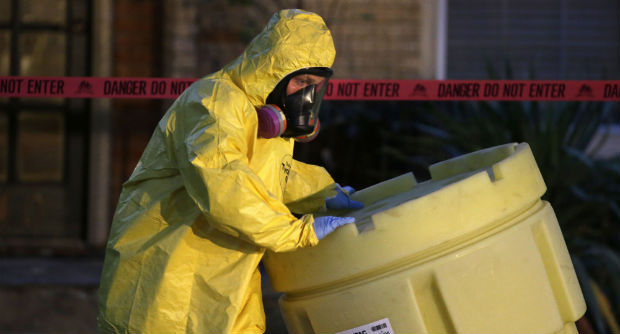Dallas nurse catches Ebola from man who died

A hazmat worker moves a barrel while finishing up cleaning outside an apartment building of a hospital worker, Sunday, Oct. 12, 2014, in Dallas. The Texas health care worker, who was in full protective gear when they provided hospital care for Ebola patient Thomas Eric Duncan, who later died, has tested positive for the virus and is in stable condition, health officials said Sunday. AP
DALLAS – Health officials are intensifying the monitoring of hospital workers who provided care to the first person to be diagnosed with Ebola in the U.S. after one of them was infected with the virus despite wearing protective gear.
Tests confirmed the first known case of Ebola transmitted in the nation, raising questions about assurances by health officials here that the disease will be contained and any American hospital should be able to treat it.
Dr. Tom Frieden, head of the Centers for Disease Control and Prevention, said Sunday that there had been a breach of protocol that led the worker to become infected while treating patient Thomas Eric Duncan, but officials are not sure what went wrong. Duncan, who traveled from Liberia to visit family, did not get sick until he arrived in the U.S. He died Wednesday.
Liberia is one of the three West African countries most affected by the Ebola epidemic, which has killed more than 4,000 people, according to World Health Organization figures published Friday. The others are Sierra Leone and Guinea.
The worker who treated Duncan has not been identified. The worker has not been able to point to how the breach might have occurred.
Article continues after this advertisementPresident Barack Obama asked the CDC to move as quickly as possible to investigate the incident, the White House said.
Article continues after this advertisementDallas police barred entry to the health care worker’s apartment complex Sunday. Officers also knocked on doors, made automated phone calls and passed out fliers to notify people within a four-block radius about the situation, although Dallas authorities assured residents the risk was confined to those who have had close contact with the two Ebola patients.
The worker wore a gown, gloves, mask and shield while she cared for Duncan during his second visit to Texas Health Presbyterian Hospital, said Dr. Daniel Varga of Texas Health Resources, which runs the hospital.
Duncan, who arrived in the U.S. from Liberia Sept. 20, first sought medical care for fever and abdominal pain Sept. 25. He told a nurse he had traveled from Africa, but he was sent home. He returned Sept. 28 and was placed in isolation because of suspected Ebola.
Texas health officials have been closely monitoring nearly 50 people who had or may have had close contact with Duncan in the days after he started showing symptoms but before he was diagnosed with the disease.
The health care worker reported a fever Friday night as part of a self-monitoring regimen required by the CDC, Varga said.
Another person described as a “close contact” of the health worker has been proactively placed in isolation, he added, without elaborating on where that person is being monitored. The hospital said its emergency department is diverting ambulances to other hospitals, though is still accepting walk-in patients.
Frieden said officials are evaluating and will monitor any workers who may have been exposed while Duncan was in the hospital.
Among the things the CDC will investigate is how the workers took off protective gear, because removing it incorrectly can lead to contamination. Investigators will also look at dialysis and intubation — the insertion of a breathing tube in a patient’s airway. Both procedures have the potential to spread the virus.
“We knew a second case could be a reality, and we’ve been preparing for this possibility,” said Dr. David Lakey, commissioner of the Texas Department of State Health Services. “We are broadening our team in Dallas and working with extreme diligence to prevent further spread.”
Every emergency room needs to be prepared to isolate and take infection control precautions, because no one can control where an Ebola patient might show up, said Dr. Dennis Maki, University of Wisconsin-Madison infectious disease specialist and former head of hospital infection control.
However, only large hospitals such as those affiliated with major universities truly have the equipment and manpower to deal with Ebola correctly, Maki said.
The case heightens concern for health workers’ safety, and nurses at many hospitals “are alarmed at the inadequate preparation they see,” says a statement from Rose Ann DeMoro, executive director of the union, National Nurses United.